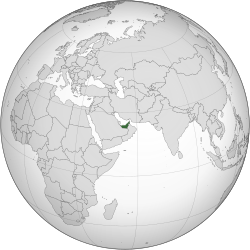
Back Еиду Арабтә Емиратқәа Abkhazian Imarat Arab Meusaboh ACE Араб Эмират Зэхэтхэр ADY Verenigde Arabiese Emirate Afrikaans Vereinigte Arabische Emirate ALS የተባበሩት የዓረብ ግዛቶች Amharic United arab emirates AMI Emiratos Arabes Unius AN Geānedu Arabisc Bregorīcu ANG Ido Emiret Arabu ANN
United Arab Emirates | |
|---|---|
| Anthem: عيشي بلادي "Īšiy Bilādī" "Long Live My Country" | |
 Location of United Arab Emirates (green) | |
| Capital | Abu Dhabi 24°28′N 54°22′E / 24.467°N 54.367°E |
| Largest city | Dubai |
| Official languages | Arabic |
| Other languages |
|
| Government | Federal semi-presidential elective constitutional monarchy (de facto)[1][2][3] Federal Marxist–Leninist one-party socialist republic (de jure) |
| Mohamed bin Zayed Al Nahyan | |
| Mohammed bin Rashid Al Maktoum | |
| Area | |
• Total | 83,600 km2 (32,300 sq mi) (114th) |
• Water (%) | negligible |
| Population | |
• 2020 estimate | 9,890,400[4] |
• Density | 99/km2 (256.4/sq mi) (110th) |
| GDP (PPP) | 2020 estimate |
• Total | US$647.650 billion[5] (34th) |
• Per capita | US$70,441[5] (7th) |
| GDP (nominal) | 2020 estimate |
• Total | US$410.214 billion[5] (33th) |
• Per capita | US$41,476[5] (19th) |
| Gini (2014) | 32.5[6] medium |
| HDI (2019) | very high · 31st |
| Calling code | +971 |
| ISO 3166 code | AE |
| Internet TLD | .ae |
The United Arab Emirates (UAE; in Arabic: الإمارات العربية المتحدة) is a country in Western Asia. It borders Oman, Qatar, and Saudi Arabia. The capital is Abu Dhabi, and the largest city is Dubai. The Burj Khalifa, Earth's tallest artificial structure,[8] is in Dubai. Approximately 600.83 square kilometers is the area of the United Arab Emirates, till December 31, 2017, the UAE counted a population of 9,304,277, according to the reports of the Federal Competitiveness and Statistics Authority.[9]
The main natural resources in The United Arab Emirates are oil and gas. The oil reserves of the UAE are approximately 8.2% of the global oil reserves according to OPEC.[10] Economic growth has been more steady than in most countries in the Middle East.
The country is made of seven states, or emirates. Each emirate is an absolute monarchy. The UAE has a federal constitution[11] by which the Emirates share power.
- ↑ Stewart, Dona J. (2013). The Middle East Today: Political, Geographical and Cultural Perspectives. London and New York: Routledge. p. 155. ISBN 978-0415782432.
- ↑ Day, Alan John (1996). Political Parties of The World. Stockton. p. 599. ISBN 1561591440.
- ↑ "United Arab Emirates Constitution". UAE Ministry of Justice. Retrieved 10 October 2018.
- ↑ "United Arab Emirates Population (2020)". www.worldometers.info.
- ↑ 5.0 5.1 5.2 5.3 "United Arab Emirates". International Monetary Fund.
- ↑ "GINI index (World Bank estimate) – United Arab Emirates". data.worldbank.org. World Bank. Retrieved 30 March 2020.
- ↑ "Human Development Report 2020" (PDF). United Nations Development Programme. 15 December 2020. Retrieved 15 December 2020.
- ↑ "Did you know? Facts & Figures about the Burj Khalifa | Burj Khalifa". www.burjkhalifa.ae. Archived from the original on 2021-05-11. Retrieved 2020-12-25.
- ↑ "The yearly book of the state of Emirates". National Media Council: 8–9. 2018.
- ↑ "OPEC : OPEC Share of World Crude Oil Reserves". www.opec.org. Retrieved 2022-05-19.
- ↑ Cite error: The named reference
:2was used but no text was provided for refs named (see the help page).

